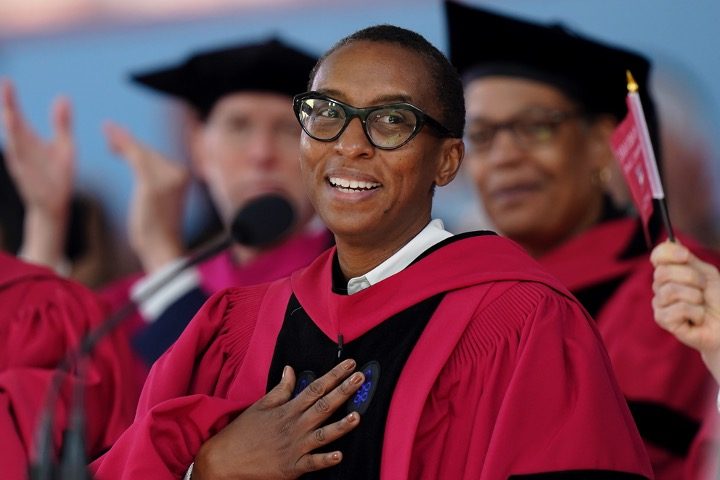
A new 37-page complaint to Harvard University alleges more than 40 instances of plagiarism by President Claudine Gay, whom the university supported after previous allegations of academic fraud.
The latest complaint to the university’s research integrity officer, reported by the Washington Free Beacon, includes new allegations and also reprises those previously reported. The latter include Gay’s stealing from conservative black Professor Carol Swain.
The allegations suggest that Gay might be the most notorious plagiarizer since Martin Luther King, Jr. cheated his way through Boston University for a doctorate, or since Joe Biden plagiarized in law school, ripped off speeches from others, and even plagiarized the biography of a foreign leader.
The Latest
When the New York Post, the Free Beacon, and conservative writers Christopher Rufo and Christopher Brunet uncovered the theft in Gay’s doctoral thesis and academic articles, the university stood behind Gay, another of the many black academics obsessed with race, as the thesis shows.
But now Harvard might find itself unable to wriggle out of firing Gay.
“The document paints a picture of a pattern of misconduct more extensive than has been previously reported and puts the Harvard Corporation, the university’s governing body—which said it initiated an ‘independent review’ of Gay’s scholarship and issued a statement of support for her leadership—back in the spotlight,” the Free Beacon reported:
The new allegations, which were submitted to Harvard’s research integrity officer, Stacey Springs, include the examples reported by the Washington Free Beacon and other outlets, as well as dozens of additional cases in which Gay quoted or paraphrased authors without proper attribution, according to a copy of the complaint reviewed by the Free Beacon. They range from missing quotation marks around a few phrases or sentences to entire paragraphs lifted verbatim.
“See the materials below related to the scholarship of Claudine Gay, involving work listed on her C.V.,” the complaint begins:
Know that it is impossible that your office has already reviewed the entirety of these materials as many examples below have not been previously reported or submitted to Harvard. Harvard received allegations from the New York Post in late October, but these materials involve more articles and passages of text from her academic work.
As you examine whether the materials below show a pattern of plagiarism, keep in mind that Harvard has a detailed guide that explains your standards for plagiarism. That guide reads, “When you fail to cite your sources, or when you cite them inadequately, you are plagiarizing, which is taken extremely seriously at Harvard.”
The latest complaint does not separate new allegations from old, but here are two examples of Gay’s scholarship that omit quotations marks around another’s work:
Gay writing in Urban Affairs Review, 2012:
Under this assumption, one knows that the treatment impact for the noncompliers (i.e., individuals who did not use the voucher) is zero, making the ITT estimate πITT a weighted average of the impact on compliers and the zero effect on noncompliers (Bloom 1984); the weights are the portions of the sample that are compliers and noncompliers. As a result, the TOT impact can be estimated by dividing πITT by the program compliance rate for the treatment group.
The original, from the American Journal of Sociology:
Under these assumptions, we know that the average outcomes of the noncompliers in the treatment group and of the potential noncompliers in the control group are the same. Put differently, we know that the experimental impact for the noncompliers was zero. Thus, under the TOT assumptions, the ITT estimate is simply a weighted average of the impact on compliers and the zero effect on noncompliers—the weights are the portion of the sample that are compliers and the portion that are noncompliers (Bloom 1984). This result implies that the TOT impact can be calculated by simply rescaling the ITT estimate by the program compliance rate.
And again, Gay used Swain’s work verbatim as well in her dissertation.
Gay:
Since the 1950s, the reelection rate for incumbent House members has rarely dipped below 90%
Swain:
Since the 1950s the reelection rate for House members has rarely dipped below 90 percent.
Harvard’s Rules
The complaint cites Harvard’s academic standards to show that the university did not take the original allegations seriously.
Harvard’s guide on using sources is clear: “When you fail to cite your sources, or when you cite them inadequately, you are plagiarizing, which is taken extremely seriously at Harvard.”
The complaint takes the nation’s oldest university to task for what amounts to ignoring the allegations, clearing Gay before a thorough review of her scholarship, and ordering a university defamation attorney to implicitly threaten the New York Post.
Despite the charges, all hope might not be lost for Gay, even if Harvard boots her. She might just become a Democratic presidential candidate and perhaps even POTUS. Joe Biden did.
Biden stole material from a Canadian politician’s speech. He used events from the life of British Labour Leader Neil Kinnock to embellish his unremarkable past. In law school, he was convicted of stealing material without attribution for a law review article.
That last literary crime ended his first presidential bid in 1987.



